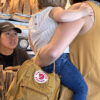Watch out Virginia. You’re next. According to TBD.com, Virginia House of Delegates member Joseph Morrissey will introduce legislation next week to tax residents 20 cents for every plastic bag they receive at a grocery store or retailer. Following the lead of Washington, D.C., Delegate Morrissey sees an opportunity to punish shoppers and low-income earners in order to “chang[e] people’s attitudes.”
This is just the latest effort by the radical environmental left to punish their fellow citizens who are merely trying to make ends meet on a day-to-day basis. In D.C., residents and visitors have been dealing with a careless and unnecessary nickel tax on bags for two years now imposed by the City Councilman Tommy Wells (D) and the leftist Anacostia Watershed Society.
Behavior taxes are the new trend for liberal politicians across the nation. Whether it is five cents in DC for a bag, or the crippling costs President Obama is adding to gas prices to discourage fossil fuel use. Without an economically viable and supported argument for their policies, they turn to the invisible hand of the government to penalize you daily, and hope that you simply absorb the new costs of living without a fight.
In fact, wealthier shoppers may in fact absorb the costs. It is low-income and jobless residents who are obviously hit the hardest when the government starts nickel-diming them at their local store.
But at least there is a viable explanation in Virginia for why the price of twenty cents was chosen, right? Wrong. Delegate Morrissey simply saw Ireland charging twenty pence for their plastic bags and decided it seemed like a good round number. “It wasn’t any more far-reaching than that” said Morrissey. So Morrissey wants to take a percentage of your shopping budget, on a whim. (And please, nobody tell Morrissey that different currencies have different values, otherwise he may try to raise the tax to thirty cents!)
Morrissey says that “everyone” loves his proposed tax. Alexandria, Virginia Delegate Adam Ebbin (D) is onboard as well. “I’ve heard nothing negative, only positive,” says Morrissey. This is most likely due to the fact that Morrissey and Ebbin aren’t personally going to collect their tax penalty from their neighbors. Instead they turn part-time cashiers into the long arm of the environmental movement, like Monique Johnson, a lottery agent in Northeast Washington, D.C. who told the Washington Post: “I get dirty looks all the time.”
And remember, this is all because plastic bags are evil. Of course, this premise means you believe a bag is made from thin air and has no production process or other mitigating factors. According to a Wall Street Journal report in 2009, there is little difference between paper and plastic, it’s simply about what environmental tradeoffs you are willing to choose. Paper bags need more energy and water to produce and result in more greenhouse gases, but plastic are less likely to be recycled.
Of course, as recycling becomes more accessible everyday, this argument carries less weight. In fact, plastic bags make up a miniscule portion of landfill waste and a study in San Francisco showed that chewing gum makes up entirely more street litter. (Please, nobody tell Morrissey, or he may tax chewing gum!)
But so long, as you bring a reusable canvas bag to the store, you get the eco-left seal of approval, and everyone is happy. Not so fast. Senator Charles Schumer (D-NY) is called for a federal investigation in 2010 into the excessive levels of lead found in most popular reusable canvas bags. Schumer said: “Federal agencies need to put a ban in place for reusable bags that have lead in them,” and he told the FDA: “Any situation where lead bags are coming into contact with the food being purchased by Americans needs to be immediately investigated and resolved.”
So if plastic bags are bad, and paper bags are bad, and canvas bags are bad…well what’s left? Will liberals start taxing our arms as we carry our groceries to the car?
At least the bag tax in D.C. is proven to change behaviors. Shoppers are crossing over into Maryland and Virginia to avoid the tax, like self-described environmentalist Virginia Johnson who told the Washington Post she maps out her day “to avoid having to shop in the District.”
Delegate Morrissey’s punitive tax on his neighbors in the name of environmental enlightenment is recklessly unfounded and unnecessary, especially in this economy. Just as President Obama’s efforts to unilaterally raise gas prices to change consumer behavior will merely hurt the economy while providing little value to the environment, Delegate Morrissey’s efforts are equally destructive.
If you think these taxes don’t affect you because you don’t live in D.C. or Virginia, think again. Many states are considering the same behavior taxes, or thinking of entirely new ones. Maryland has been debating bag taxes for years, and just this week, Maryland lawmakers also began consideration of a ten cent tax on each individual alcoholic drink sold in the state. (Logically, a six-pack would cost 60 cents more while a keg would cost ten cents). San Francisco, CA, already the leader in behavior taxes is now extending their reach into McDonald’s Happy Meals.
Behaviors indeed need to change…the controlling tax-and-spend behavior of leftist politicians.





























